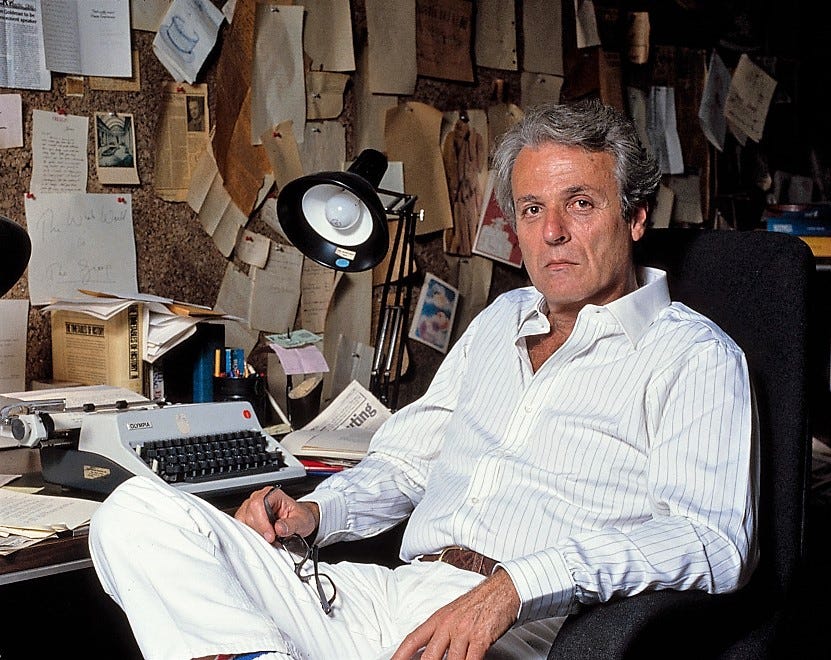Before I’d read his books, I had little first-hand experience of William Goldman — one of the great American screenwriters. I’d seen an interview of his in which he radiated wit, charm and self-deprecating good sense. Give it a watch yourself. I loved All the President’s Men, which he wrote but later effectively disowned. And I think — I think — that was it. Never seen Butch and Sundance. Never read The Princess Bride. Who or what, precisely, I thought, is ‘Waldo Pepper’?
So why, with all the distance between our frames of reference, did I alight on two of the late Mr. Goldman’s books on screenwriting, these instructional-guides and memoirs? And why, more than enjoy them, to paraphrase Kingsley Amis, did I enjoy them so much?
It’s all there in the interview, I think — if you would take a look. If you make it through the whole thing, you will — I humbly predict — come away with a few insights. The first is that he’s basically right about Hollywood. There is ancient, brilliant wisdom in Goldman’s dictum that nobody knows anything. The producers chase trends or they don’t and it either works or it does not. They get stars who either prosper or flop. They greenlight things which either disappear without a trace or are beloved and enshrined within the human heart and the historical experience of having been alive at that time. And no one has a clue how to affect the outcome.
The second thing, I predict, is that you’ll think something else — a thought that can be summarised as ‘what a guy’; and you won’t be wrong.
Goldman did a lot of things in life and I’ll briefly capitulate them. He was in the army, he was a professor — a professor whose sole modest goal, he writes, was to be remembered forever by his students.
He wrote for Broadway, he wrote novels, he wrote screenplays — many of them, according to the Academy, good. And he survived, and kept plugging away, despite thinking most directors were hacks, most stars were by turns vain and petrified — most studio heads were only deferring the sack with their talk of ‘my friend Cliff’, ‘my friend George’, and their claims that ‘De Niro and I have a special relationship’.
All of these people fought Goldman as much as worked with him; they resisted his ideas and sent him into mid-career exile. (And he is sore, to use an Americanism, about it all — you best believe me.) The critics dismissed his novels, the test-screen audiences did not like his films. But he persisted, nonetheless.
There’s something noble in it. But let’s not get carried away. He’s not Terry Gilliam on the set of Don Quixote — thwarted by man, nature, god himself, and still fighting. Goldman is instead a slightly nebbishy character, and his reaction to Hollywood and its excesses is not snarled. It is amused.
I can’t do justice to how hysterically funny these books can be, and it would be cruel of me to steal some of Goldman’s jokes and asides to burnish my own newsletter, and to deprive you the pleasure of finding them later in print. But suffice to say, he knows his way around a punchline, begged, borrowed, stolen or thought up on the spot.
He knows Hollywood hokum and how to dissect it.
But I don’t want to misdirect you. These books aren’t back-to-back funny. What they are instead is that rare thing: they are readable. You read them, and don’t get bored, and you keep going on, sure that you are in good company.
So as Goldman BSes about his early trips to Hollywood and talks about meetings with producers and directors and what have you, you’re simply interested. When he has a triumph, it radiates out warmly, even as he does an over-the-top immodest pose. When he has a failure, it’s often written up to make you laugh, and with lessons for you to learn in the process, as the author theatrically seethes.
Because his are books intended to teach you something about screenwriting — so that’s the kicker. If you’re not interested in reading scripts, thinking about why certain scenes work, and others do not, and what studios will do to ruin a picture: this is not the book for you. If, however, you do enjoy it — the digressions about plot threads, the discussions of how — memorably — to write an adaptation of a sprawling 700-page thriller (which later became the Eastwood vehicle Absolute Power, which I’ve not seen), this is a home and a heaven.
Stories about Newman and Redford certainly, tales of Attenborough on the set of A Bridge Too Far, funny asides about financiers and studio heads. A series of reflections on why Clint really is that magical and really is that down to earth. All the good stuff.
But also reflections on trying to write and getting nowhere. Wasted time in early adulthood. A brief detour around why Gatsby is one of the most beautiful novels in the American canon, and why it’s apparently easy for an Englishman to read the whole thing wrong and royally screw the thing up for the screen. And anecdotes about the ‘stupid courage’ in pictures and art which so Goldman loves, and which, he says, always makes him cry hysterically.
These books are grab-bags. A little unfocused, undisciplined, for some tastes. And perhaps a little hard to like if you’re not into it all. But I enjoyed them. I found Goldman fine, amusing company, and happily strode on, through all 800 easy-reading pages of the books, until I had exhausted them both.


